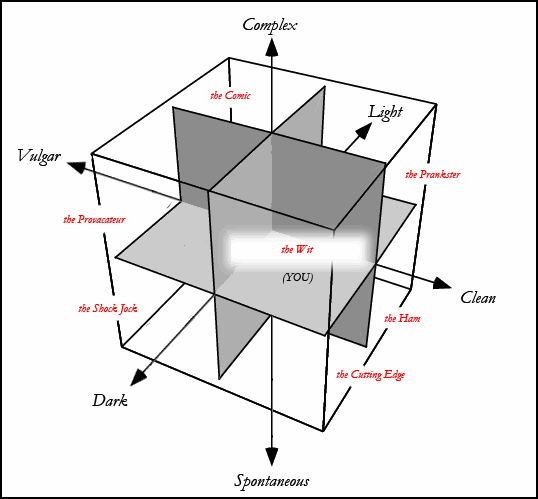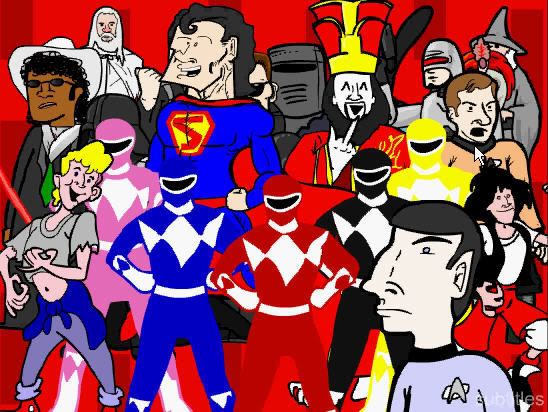First the good news: the meeting with Natalie's parents went very well, as did her commencement walk.
Now the bad news:
All good things must come to an end. I've taken stock of my time and energy and find that I don't have a surplus of either, so something has to give and that something is the blog.
I've had a great deal of fun with it over the last several years and have enjoyed the commentary that you guys have left for me. I hope that you've had fun, too.
I want to particularly thank, in no particular order, Arturo, Ron, Marvin the Martian, and Rob for your witty replies and rejoinders, as well as my lovely and patient girlfriend who has encouraged the blog, behind the scenes, since its inception. It's been a genuine pleasure.
I'm going to keep the existing posts up as an archive but I won't be making any more posts. If the blog bug ever does strike me again, I'll start fresh with a new site (and I'll be sure to email everyone whose address I have).
Take care, everyone, and good night.
Friday, July 11, 2008
Curtain Call
Labels: administrivia, goodbye
Wednesday, June 11, 2008
1000 AD
I'm feeling a bit guilty about leaving the blog fallow for so long, in spite of the fact that, yes, I really don't have any enough time to give it the attention that it deserves.
That said, he's a little something to chew on in the meanwhile.
The Marginal Revolution blog has posted an interesting question: if you were suddenly transported back to the year 1000 AD and found yourself somewhere in Europe with nothing but the clothes on your back, what would you do to survive and prosper?
The comments section is lively with many thoughtful proposals. My own feeling is that people who dream of becoming uber-Edisons would be in for a rude shock: advancing technology is a lot harder than it looks. A lot of people, for instance, suggest inventing the steam engine. That's a great idea that's very likely to get you killed given the poor quality of the metal involved and the fact that even reasonably well constructed steam engines have been known to blow up.
Natalie and I both side with the idea that the real advantage that the average person has is a superior system of arithmatic. It's far easier to do calculation with Arabic notation than in Roman notation (try dividing CLXX into MCMIV without converting the numbers into decimal form if you doubt me). Given this, I think that the smartest course of action would be to hook up with the local nobility as soon as you can manage the language and take over their book keeping. If you know even basic double-book accounting, you'll be a indespensible asset to his lordship.
Once you have some social and financial capital, you can work on more ambitious projects (preferably letting someone else actually do the dangerous experiments).
In any case, the commentary is well worth reading and I invite you to post your own ideas, here.
Labels: accounting, history, mathematics, technology, time travel
Tuesday, May 27, 2008
Apologies and Omens
My "three" readers have doubtless noticed that the blog has been a bit sporadic.
The reason for this is that Natalie's parents will be coming to visit in a few weeks (the first time I will have met them) which means that much of our time is being dedicated to cleaning up the house and otherwise getting prepared. Between that and school and work and those rare interludes where Nat and I can actually enjoy one another's company, the blog is way down on the priority list.
Expect few if any posts for the next several weeks but take heart that I haven't called it quits.
Labels: administrivia
Wednesday, May 21, 2008
Unstructured Roller-Music
For your amusement: some guy playing music by skating next to partially filled wine bottles with spoons taped to his feet.
Monday, May 19, 2008
Spire Comics

What you see here is isn't some sort of neo-Nazi propaganda; rather, it's Christian propaganda.
I try not to be too hard on the Christian urge to evangelize. I appreciate the fact that their world view tells them that humanity is trapped in the metaphorical equivalent of a burning house with only one exit and that they feel that it's their moral duty to try to rescue us from that conflagration. Viewed from that perspective, evangelists and missionaries really are trying to do something moral, never mind that the rest of us get awfully tired of trying to be pulled from a burning building that we don't believe actually exists.
Be that as it may, some methods of evangelization take such absurd forms in their attempt to "reach" people that it's nearly impossible not to point and laugh. A particular egregious form of this is that of Christian comics. I have no doubt that we're all familiar with the works of Jack Chick, but Chick ministries aren't the only ones who've attempted to spread the word of Jesus through crappy art, stilted dialog and plots that a pre-schooler should find simplistic. A lesser known -- but still weirdly fascinating -- company is Spire Comics who ran a line of Christian themed comics such as the above "Hansi: The Girl Who Loved the Swastika" -- about a girl who initially loved the Nazis but eventually came to love Jesus -- as well as many others including quite a few surreal Archie Comics cross-overs.
I found a good fan site that has PDF versions of many of their comics. If you like reading Chick tracts (for a suitably broad definition of "like") I'm sure you'll enjoy reading these as well.
Labels: christianity, comics, religion
Tuesday, May 13, 2008
A Brief Primer on Interesting Loved One's in All Things Geek
I'm proud to say that I've recently interested my girlfriend Natalie in the new Dr. Who series. Given that I also managed to get her interested in Magic the Gathering a number of years ago, I'm beginning to think that I'm that rarest of geeks; call me Speaker to Women. Seriously, I believe that there are some general rules that geeks of all sexes can follow to help their non-geek S.O.'s become interested in geeky hobbies and interests. [1]
Given this, here's a few tentative suggestions on how you may be able to interest your S.O. in the geek things that you love.
1. Don't push
This really is critical. The simple fact of the matter is that every couple has a disjunction of interests and there are going to be things that you're interested in that they aren't.
2. Express an openess to share your enjoyment
Even though you shouldn't push your interests, you can make it known that you would be open and happy when it comes to sharing your interests. Simply knowing that there are things you love and that you would be open to sharing those loves with your S.O. goes a long way.
3. A little nudge is better than a big push
I got Natalie interested in Magic the Gathering by inviting her to sit in on a single online game with me. I made it clear that it was only the one game and that all I wanted was for her to see the game so that she could better understand why I spent so much time playing it. After that one game she, of her own initiative, asked me to play another one. It wasn't long before she was playing herself (and building better decks that me, at that!)
4. Be a faucet and not a firehose
Geeks tend to be obsessive about details. I'm no different than any other geek. If there's something I love, I'm all about the minutia. Unfortunately, it's easy for newcomers to be overwhelmed by that sort of detail. Start slow with a general sketch of whatever it is you're interesting them in (be it a game or a television show, or what have you), answer their questions as simply and concisely as they arise ("That thing's a sonic screwdriver; it's kind of like a high-tech Swiss army knife"), and gradually offer more detail as time passes.
I really think that this is the step where most geek outreach efforts flounder. We forget outselves and start babbling about trivial details that matter to us but which really aren't central to whatever it is we're trying to introduce our S.O.'s to.
5. Know your audience
There are many things that Natalie is not and probably never will be interested in. Because of how well I knew Natalie, I was able to guess that Magic the Gathering would probably appeal to her. Likewise, when she asked about Dr. Who, I strongly suspected that she would appreciate the humor and drama of the series so I knew that it was worthwhile to make an effort to introduce her to it (and I would have been forthright if I had thought that it wouldn't be her thing).
6. Always be respectful
Sometimes your efforts to introduce that special someone to some element of your geek lifestyle just isn't going to be a big success. People have different interests and there's nothing wrong with a couple not sharing a complete set of mutual interests. Mind you, because we are geeks and because geeks are obsessives, it can sting to discover that your S.O. doesn't like -- or worse, dislikes -- something that you love. It can be hard not to take that sort of rejection as a personal rebuke. Don't. Just because they may think that Battlestar Galactica is dull or that AD&D is vastly overrated doesn't make them bad people nor does it imply that they think that you're defective for liking things that they don't.
[1] In all fairness, it should be noted that I didn't turn Natalie into a geek: she came prepacked as one. She's a Georgia Tech alumnus, she knows and loves Monty Python, she likes superhero movies (although she's never read any comics to speak of), and she used to roleplay entirely of her own initiative. That said, Natalie is also fully a woman (you should see the way she likes to play dress-up with her avatars) and not all things geek are of interest to her.
Labels: geek, relationships
Monday, May 12, 2008
A Superhero Glut?
Ross Douthat, of The Atlantic, worries that there is a looming glut of superhero movies.
I agree that it is very likely that his prognostication is on the mark: I fully expect for there to be a surplus of superhero movies over the next several years. What puzzles me, however, is that Ross seems to think that there's something unusual about this.
For all its ballyhooed liberalism, when it comes to financing projects, Hollywood is actually a very conservative town. Producers don't generally like to risk putting their money on risky projects. As a consequence of this, Hollywood tends to be self-imitative. When a movie is a success, the first thing most studios will want to do is to make a sequel. If several movies in a genre succeed, it's a safe bet that more movies in that genre will be produced.
The sorts of gluts that Ross is worried about are perfectly common. For decades, the studios cranked out an endless sequence of westerns and musicals. In the 70's, cop dramas were all the rage. In the 80's and 90's, you couldn't have summer without big action movies stuffed to the brim with explosions and car chases. We also passed through a science fiction craze and, if it weren't for a number of failures, I'm sure that we'd be neck deep in fantasies right about now.
While this type of repetition can get annoying, this is a case where the market invariably corrects itself over time. When people get tired of a genre, they stop spending money on it and as other genres become more successful the old is replaced by the new. I would not be surprised to see a lot of superhero movies out in the next five years, but I would be shocked if they were still making as many of them ten or fifteen years from now. Sooner or later people are going to decide that enough is enough.
Ross Douthat is not a fool when it comes to cinema. He's quite familiar with the history of the medium and I'm sure that he realizes that these movies are part of a larger cycle, so his concern is a bit puzzling. I suspect that the real nature of his concern might be found we he frets that "if we aren't careful, the next generation of Coppolas and Scorseses, De Niros and Streeps will spend the best years of their creative lives toiling away on Spiderman 8 or X-Men Origins: Kitty Pryde."
It would, indeed, be a sad thing if the next generation of talented actors were to find themselves trapped in superhero roles, especially given the risk of typecasting. This is not a trivial concern. One can consider the effect that Star Wars had on the Careers of Mark Hamil and Carrie Fischer (and I wonder if Elijah Wood will ever regret playing Frodo); however, I think that a case can be made that the more popular a genre becomes, the less likely it is that new talents will find themselves trapped in them.
The reason for this is that directors and producers want to hire the very best talent that they can afford for their productions. Likewise, actors tend to compete for those roles that are the most lucrative. This means that the most sought after roles will tend to go to the so-called A-List actors (with a similar effect for the directors). The next young De Niro won't be playing Iron Man precisely because the role is going to go to Robert Downey Jr whose already established his credentials.
This might sound like a bad thing for Downey and it would be if he had no choice in the matter but, being an A-List actor, he has his choice of roles. The only reason for him to play Iron Man is because he wants to be in the Iron Man movie. No matter how saturated the market becomes, there will always be alternative roles (even lucrative ones) and no A-List actor or director will ever find themselves in a position where they are forced to make a movie where the principle character is wearing tights (and we're not talking Shakespeare).
As for the up-and-coming B-List actors and directors who have great potential, no one will hold it against them if they find themselves compelled to take frivolous roles. Hollywood well understands the concept of paying one's dues and so long as those bright talents can avoid the pitfall of typecasting, I don't think that such efforts will especially hurt their careers. And if they do succumb to typecasting, there's nothing especial about the superhero genre that promotes it. Good actors (and even directors) have fallen prey to that trap in every genre and it is simply something that they all need to be aware of.
So why is Ross concerned? I suspect the real reason is not that he fears that good actors will be forced to play genre roles but that he fears that they will be tempted by such roles. I think that Ross loves the cinema and that, as much as he is willing to tolerate and even enjoy the occasional superhero lark, he wants the best actors playing the roles that he considers to be the most serious, just as he wants the best directors to be working on those works of art that exemplify all that cinema can be.
Mind you, I could be wrong. I don't know Ross Douthat personally and this supposition should be read as conjecture. Never the less, if that is the root of his concern, I think he worries for naught. The very best directors aren't going to feel compelled to follow the crowd. When Kubrik made 2001: A Space Odessey and A Clockwork Orange it wasn't because he thought that he had no choice but to make science fiction (indeed, he made them at a point where most directors were disdaining the genre). Likewise, the De Niros of the world will do as they will precisely because they are 800 pound gorrillas who are fully aware of the weight they can throw.
But even if some top-mark director or actor desires to make a genre film, so what? They are adults and it is up to them to decide what is and is not dignified for them to do. Robert Downey Jr.'s Oscar isn't tarnished because he decided to don a gold and red suit just as Kubrik wasn't diminished for dipping into the horror genre with The Shining. Whether or not someone like Ross thinks that such projects are unworthy of the participants is irrelevant so long as those participants have any choice in the matter and I don't believe that he's made the case that they don't.
Labels: movie, superheroes
Sunday, May 11, 2008
Unstructured Overdrift
The Duncan Brother's "Overdrift" is a way-over-the-top parody of the already way-over-the-top genre of street racing movies (think "The Fast and the Furious: Tokyo Drift").
A higher-resolution version can be found here.
Labels: Bad Movies, parody, Racing
Saturday, May 10, 2008
Paper vs. Paper
As far back as I can remember, my favorite form of animation has been stop motion. I used to spend hours making clay dinosaurs in the hopes that, one day, I too could become a create of stop animated shorts (if only on the side).
Sadly, aside from a rather bad movie I made in the 5th grade, I never did follow through on that dream. Be that as it may, I remain appreciative of the talent it takes to create such works.
Labels: animation, Cool, Stop Motion
Friday, May 09, 2008
Thursday, May 08, 2008
Wednesday, May 07, 2008
On the Successes and Failures of Superhero Movies
Natalie and I saw the new Iron Man movie over the weekend and were much impressed by it. So much so, in fact, that it led to a late-night discussion at Denny's (which is the natural environment for late-night discussions) over why the Iron Man movie worked (in our opinion) so well and why so many other superhero movies have been disappointments. This, in turn, led me to consider the general factors that influence the success or failure of such efforts and why making superhero movies is a risky (albeit potentially lucrative) venture.
Character Matters
Outsiders to the genre often make the mistake of thinking that superhero movies are primarily, or even only, about the pyrotechnics and the effects. They believe that people who like superheros are only really interested in over the top fights where hyper-muscular beings punch one another into and through major structures.
Given that the central defining characteristic of the genre is, in fact, super powers (or their technological equivalent), such a misconception is understandable and, indeed, a superhero comic that never had super-powered combat scenes would be rather dull. Never the less, a comic that focused solely on fight sequences and spectacle would also be rather dull for the typical fan of the genre. Big fights are a part of the draw but what really keeps the attention of fans and leads fans to a state of loyalty to a title or a character are the story lines and, even more fundamentally, the characters in those stories.
If you ask a fan why a given character is his favorite, the answer is rarely only going to be that said character has cool powers. More often, the real reason is that the character is an interesting person and the fan has come to know and love that character's persona.
A lot of adaptations pay only minimal attention to their characters who are often treated as mere props for the powers that those characters possess. A good example of both successful and unsuccessful character adaptation can be found in the X-Men movies. Hugh Jackman has been justifiably praised for bringing the character of Wolverine to life in a manner that is simultaneously true to the comic as well as being interesting in its own right. By contrast, Halle Barry's Storm comes across as flat and lackluster in spite of the fact that she does, indeed, look the part and in spite of the fact that her character exhibits all of the powers that the Storm of the comics possesses.
Seriousness
Seriousness is a double-edged sword. Superhero comics are based upon a basically unrealistic premise: that there exists humans who have demi-godlike powers. On top of that, the tropes and storylines lend themselves to silliness. Pick nearly any hero and look up his or her entry on Wikipedia and it's difficult not to walk away with a feeling that the entire history of the character is built upon an endless layer of absurdities. Even the most grim and gritty stories in the genre have an essential silliness built into them.
In spite of that, if the stories are the work at all, they must take themselves seriously. The genre demands a willing suspension of disbelief (SoD) from the audience and, given how deeply at odds to reality the very fabric of the genre is, it is a very easy thing for an audience to lose that sense of suspension. A good superhero story has an internal logic that it needs to adhere to in order to maintain the SoD. Many directors, however, think that the unrealism of the genre means that they can approach it frivolously. Joel Shumacher's Batman films are good demonstration of why this is a bad idea. By presenting the audience with a camp environment that went out of its way to emphasize its childishness, he made a series of films that existed only to be mocked.
It is, however, possible to be too serious. The genre is flexible and artists such as Frank Miller and Alan Moore have proven that, in capable hands, it is possible to use the genre to create serious works of art. Never the less, most superhero stories suffer from efforts to turn them into high art. I suspect that this was at the core of what went wrong with Ang Lee's adaptation of The Hulk. What ought to have been a fun and enjoyable movie was turned into something dense and opaque in an attempt to create high art. While the character of the Hulk does lend itself to a certain degree of introspection regarding the conflict of reason and emotion (and any number of other topics), at the end of the day it's a story about a man who occasionally turns into a giant green monster. Even though Lee is a perfectly capable director, his desire to turn the Hulk into something intellectual and serious was a case of poor judgment.
The Fan Boy Effect
The fans of a comic series are the best and worst friends that a director has. A good film must court the fan base but, at the same time, it needs to appeal to an audience that may not be especially (or at all) familiar with the character.
Hard core fans tend to be obsessives. Any deviation from the source material is looked upon with grave suspicion and every decision a director makes is subject to endless rounds of second guessing in the chat rooms of the world.
A good director needs to know how to thread those worlds. The best directors are those that show that they understand and respect the original works while, never the less, being willing and able to modify the stories for the needs of the screen. It is entirely possible to be too faithful to an original work just as it is possible to be too contemptuous of it.
When Sam Rami was working on the first Spiderman movie, there was a great deal of debate in the fan community over Rami's decision to make Peter Parker's web shooting ability part of his body as opposed to the web-canisters that the Spiderman of the comics uses. Many fans felt that organic webs were a blatant and disrespectful violation of the canon. Rami and his supporters argued that, in spite of the canisters prominent history in the mythos, they were an unnecessary and, frankly, unbelievable element when translated to film. I believe that history has proven that Rami's intuition was correct: having Parker shoot the webs out of his wrists is much more intuitive for anyone who isn't already intimately familiar with the original stories.
The Perils of Origin
As a general rule, when films have sequels, the first movie is generally better than the second, the second is generally better than the third, and so forth. Although the sample size is smaller, superhero movies seem to follow rule where the first movie is usually weaker than the second, the second is usually the strongest, with subsequent movies being progressively weaker than either.
It has been suggested that the reason for this is that the first movie is almost invariably burdened with the task of telling the superhero's origin. This can seem rather counter-intuitive to comic fans given that good origin stories are the stuff of legend. Who would Peter Parker be without the tragedy of his Uncle's death? How much of Superman would be left if not for the elaborate myth of the end of Krypton? Origins aren't only crucial to understanding who these heroes are, they are some of the very best stories that the genre has produced.
Why then are origin stories such a detriment when brought to film. A big part of it is that film and comics are different media. A story that works well in the bright four-color paneled world of a comic can easily seem contrived and even fairly boring when brought to screen. Paradoxically, this is particular true when the character is popular enough that the general public is familiar with the character. Most people know that Superman was born on Krypton, that he was sent to Earth, and that he was raised by the Kents. Consequently, being forced to sit through an origin that they already know can be a boring thing. When people are less familiar with a character (as is the case with, say, Iron Man) it's actually easier to interest the audience in that story.
Because the origin story is such an integral part of the genre, however, directors are loath to dispense with it. So a good director has to find a way to tell a familiar story in an unfamiliar way. Both Tim Burton's original Batman movie and Christopher Nolan's Batman Begins dealt with the origin of Batman but even though the basic elements remained the same the execution, style and emphasis were wholly different. Consequently, very few people felt that the latter simply retrod the ground laid down by the former. Doing this, however, requires an exceptional degree of talent and many directors simply aren't up to the task of making the origin story as interesting as it needs to be.
And So Forth
Anything that can make a non-superhero movie bad can do the same to a genre film. There are an infinite number of ways to ruin a film from slipshod continuity to poor casting to tin-eared dialog, etc. All the ordinary problems that face any movie confront the director of a superhero film. However, in addition to those normal pitfalls there are additional ones. A good movie can be ruined by bad special effects. Sometimes the very project is an uphill battle because the character is either not well known outside of the genre (such as Elektra) or is simply not that great of a character to being with (such as the Sub-Mariner).
There are so many difficulties facing this style of movie that one might feel surprised that any of these movies can succeed, much less succeed spectacularly; however, when a superhero movie does hit all the right notes, it can tap into that same mythic well that makes the comics such an enduring part of our cultural landscape. The original Superman movie promised that we would believe that a man could fly... and we really did. Rami's Spiderman brought us into the conflicted world of Peter Parker and made us see why his powers were such a burden upon him. People were able to see past the obvious spectacle of the X-Men movies into the deeper message about prejudice and bigotry.
Most of all, a good superhero movie can also bring out a feeling that is purely childlike without being at all childish. It can make us feel happy, joyful and hopeful. It is for these very reasons that the misfires and the failures are so utterly disappointing. It's not merely that the failed movies are bad, it's that we sense that they could have been something so much better than they were. Granted, one may well wonder if any adaptation of something like The Punisher or Daredevil could have risen to the occasion, but it remains the case that we always hope that they will and on those occasions when such a movie does succeed it is a genuinely marvelous thing.
Labels: movie, story, superheroes
Tuesday, May 06, 2008
Unstructured Interface
I'm glad to report that my finger is mostly healed, so I can start to get back to blogging a bit. Let's start with Pico:

Pico is an interesting variation of the horizontal touch-screen interface. The Pico interface uses magnets to move objects around its screen.
I'm not sure whether this will have have practical applications, but I do think that it's reasonably cool.
Here's a video of Pico in action.
Thursday, April 24, 2008
Ouch
Quick note: no blogging for awhile. Sliced finger open with very sharp knife. Typing is a bit excruciating in the meanwhile. Back when this heals.
Labels: administrivia
Thursday, April 17, 2008
Edward Lorenz, RIP
Life, with it's many strange attractors, has come to a conclusion for one Edward Lorenz, one of the pioneers of chaos theory.
Somewhere, a butterfly is sadly flappings it wings.
Labels: Chaos Theory, Edward Lorenz, Obituary
Unstructured Suntory
If you have even a passing familiarity with the Final Fantasy games, I think you'll get a kick out of this tie-in commercial for a line of Final Fantasy themed "Suntory" drinks.
Labels: Commercial, Final Fantasy, Japanese, weird
Wednesday, April 16, 2008
Tuesday, April 15, 2008
Trapped in an Elevator
 If ever you feel that you're having a bad day, consider the plight of Nicholas White.
If ever you feel that you're having a bad day, consider the plight of Nicholas White.
White was working late and decided to take a smoke break. After he finished his break, he got back into one of the elevators in the building and pressed the button for the 43rd floor. He would remain trapped in that elevator for the next 41 hours unable to escape and with precious little to occupy his mind.
I've been reading a book called The Black Swan whose major thesis is that a certain category of rare event can have a disproportional impact. White's case seems to be one such "black swan". Getting trapped in an elevator for nearly two solid days was something that was impossible to anticipate but the impact on his life was enormous. Traumatized by the event, he essentially quit his job, engaged in an ill-advised attempt to litigate for damages (which yielded only a pittance) and has been mainly unemployed for nearly fifteen years since then.
Of course, one could argue that he should have shaken the experience off, or that another person may have been able to cope better, or that the choices he made, after the event, were unwise, but the fact remains that if he had called in sick that day, or if the elevator had been maintained better, or if security had been more observant about monitoring the security cameras in the elevators, or if he had simply taken a different elevator, the course of his life would have been profoundly different than what it was.
It is a paradox that we all face. A prudent person tries to plan for the future but the very essence of the future is that it is unpredictable and that a single event can render any amount of planning moot.
The New Yorker has the full story of Wright's experience (in addition to lots of ancillary information about elevator technology and safety) as well as a compelling time lapse video of Wright's actual ordeal.
Elevator image courtesy of Flickr user annia316 ღ
Monday, April 14, 2008
Unstructured Picture of the Interval

It is best to mock that which we abhor.
Attribution unknown
Labels: art, Humor, Ku Klux Klan
Sunday, April 13, 2008
Unstructured Glossographia

The Shakers were an odd religious group by even the standards of most of the utopian movements of the 19th century (and believe me, there were quite a lot of odd ducks in that group). They are most well known for their absolute prohibition on sexual intercourse, which is even more remarkable given the longevity of the group which managed to last well over a century via the acquisition of new converts (indeed, you can still find the occasional neo-Shaker).
Beyond the celibacy edict, however, the Shakers had other interesting and unusual traits. Above is an example of Shaker glossographia, which is the written version of glossolalia (aka "speaking in tongues") which should be familiar to anyone whose had any exposure to Pentecostalism (which is, arguably, the last and most successful of the Protestant Utopian movements).
Ubuweb Ethnopoetics has a good collection of Shaker glossographics. While I, of course, don't believe that there's anything genuinely divine in their compositions, I find it interesting to contemplate the ecstatic states of mind that led to their creation.
Labels: Glossographia, religion, Shaker
Wednesday, April 09, 2008
Zombie Strippers

I suspect that, much like Snakes on a Plane, the title of Zombie Strippers really does say everything that you need to know in order to make an informed choice about whether or not this movie is right for you.
Tuesday, April 08, 2008
The Pants Strike Back
 As a follow-up to the Blade Runner pants post, here's a list of great science fiction titles that I've "pantsed" up.
As a follow-up to the Blade Runner pants post, here's a list of great science fiction titles that I've "pantsed" up.
20,000 Leagues Under the Pants
2001: A Pants Odyssey
A Connecticut Yankee in King Arthur's Pants
A Deepness in the Pants
A Fire Upon the Pants
A Wrinkle in Pants
Brave New Pants
Childhood's Pants
Do Androids Dream of Electric Pants?
Ender's Pants
Foundation and Pants
Have Pants, Will Travel
Hitch Hiker's Guide to the Pants
I, Pants
Journey to the Center of the Pants
Lucifer's Pants
Make Pants! Make Pants!
More than Pants
Pants for Algernon
Pants for Leibowitz
Pants of the Galaxy
Pants on Zanzibar
Pants Out of Joint
Pants Plus
Rendezvous With Pants
Ring Around the Pants
Speaker for the Pants
Starship Pants
Stranger in Strange Pants
The Demolished Pants
The Door into Pants
The Forever Pants
The Invisible Pants
The Left Pants-leg of Darkness
The Lost Pants
The Man in the High Pants
The Pants Are a Harsh Mistress
The Pants Dysfunction
The Pants in God's Eye
The Pants Look Up
The Pants My Destination
The Pants of God
The Pants of Paradise
The Pants of Steel
The Pants Themselves
The Shadow of the Pants
The Stainless Steel Pants
The Three Pants of Palmer Eldritch
The War of the Pants
Time Enough for Pants
To Your Scattered Pants Go
Use of Pants
Fantasy Bonus:
Lord of the Pants
The Fellowship of the Pants
The Two Pants
The Return of the Pants
Creative Commons Pants image courtesy of "yatta".
Labels: Fantasy, Humor, Pants, Science Fiction
Wednesday, April 02, 2008
Unstructured Clocks

Nothing says "I am a major corporate enterprise" like having a wall full of clocks set to different international times.
Now, thanks to the internet, you can get that very same feeling from the comfort of your own home. I would suggest chomping on a cigar and yelling at your subordinates to complete the effect.*
* If you don't have any handy subordinates, pets and/or children may be substituted. It is not recommend that you use spouses or significant others, however.
Labels: Clocks
Monday, March 31, 2008
Unstructured Flight Patterns

This is a snapshot of a twenty-four hour visualization of flights across (as well as into and out of) the continental United States.
I love the way that you can see night and day sweeping across the country. It also astonishes me that so many flights are in the air at the same time. Once again I'm reminded of the fact that we live in a Golden age.
Labels: Air Traffic, Visualization
Saturday, March 29, 2008
Thursday, March 27, 2008
Unstructured Bendito Machine

Bendito Machine is an animated story with a moral. What, precisely, that moral is, I'm not sure. It may be a simple tale of how greed corrupts and destroys, it may be a cautionary tale about the reliance on technology, or perhaps a story about the futility of conflict and nationalism, or maybe even something to do with religion.
Regardless, the iconic animation is beautiful and the story is intriguing even if the precise message is a bit equivocal.
Be warned: this one's a bandwidth buster.
Friday, March 21, 2008
Wednesday, March 19, 2008
Obama's Race Speech
 This is not a political blog, nor do I have any desire to turn it into one largely because the world is full of such blogs and I know very well that there's very little that I would be able to add to that wide discussion. In like manner, I have few enough readers and there's nothing like politics when it comes to alienating others.
This is not a political blog, nor do I have any desire to turn it into one largely because the world is full of such blogs and I know very well that there's very little that I would be able to add to that wide discussion. In like manner, I have few enough readers and there's nothing like politics when it comes to alienating others.
Given that, I want to make it clear that I am not endorsing any candidate on this blog. I trust that you don't need hear my decision in order to reach your own.
That said, I really have to say that I was exceedingly impressed with Barack Obama's speech in which he defended his association with the Reverend Wright. As someone who has spent much of his life in words, I can appreciate quality oratory and I think that this speech proves that Obama is probably the best political orator we've seen in decades.
Of course, there is no necessary correlation between being a good orator and being a good leader. Indeed, honeyed words can lead a nation down a sour road and history is filled with such examples. At the same time, I do think that there is a positive correlation between the ability to speak clearly and the presence of a strong intellect (while hastening to add that simple ineloquence is not a definite sign of stupidity -- there are many people whose wisdom is hidden by a stumbling tongue).
I am especially impressed by what the speech says about race in America. I have, myself, tried to articulate some of these concepts with considerably less success. I am impressed by the way that it both illuminates and transcends much of the real and even reasonable suspicions that divides America. I have long felt that the charge of racism has often been deployed simplistically and that prejudice is often a much more complex and subtle thing than is credited and that saying that something, or someone, is racist is too much of a binary categorization to be either meaningful or useful in the vast percentage of cases where the word is used.
Sunday, March 16, 2008
Unstructured Gravity

If you've ever played the old Artillery computer game, Gravity Pods is essentially the same game except that the artillery is deflected by attractors and repellors.
It's a simple game while still being quite addictive.
Friday, March 14, 2008
Unstructured Pi

In honor of International Pi Day (which is also, conincidentally, my birthday), here's a song about the virtues of pi by Alan Ferrier and Antoni Chan.
Thursday, March 13, 2008
Unstructured Eruption

Here's a rather specatular orbital photo taken of the Aleutian Islands' Cleveland Volcano taken for NASA's Earth Observatory. Click here for a larger image.
Labels: Cool, Geology, photography, Science, Volcanology
Wednesday, March 12, 2008
Unstructured Glowsticks

There's a good chance that you've already come across the "Will it Blend" site by Blendtec. If you haven't, Blendtec is a company that makes industrial strength blenders. They've created a series of viral videos whose shtick is them taking various objects and destroying them in their blenders.
The entire site is good for when you're in the mood for a bit of entropy by proxy but I particularly like the demonstration of blending a bunch of glowsticks.
Thursday, March 06, 2008
Wednesday, March 05, 2008
Unstructured Microart

Willard Wigan specializes in amazingly tiny sculptures.
I wasn't able to find a good gallery of his work so, instead, here's a Google Image Search link that returns quite a few samples.
Enjoy.
Labels: art, Cool, Microart, Willard Wigan
Tuesday, March 04, 2008
Gary Gygax, RIP
Troll Lord Games, who currently publishes Gary Gygax's work, has reported that Gary Gygax has died. Although I haven't seen reports in the mainstream media, I'm inclined to view this as a credible report.
Generations of introverted teenage geeks have Gary to thank for providing us with a creative social outlet for our geekery. While D&D has often been stereotyped as a way for kids to avoid contact with others the truth is that it, more often than not, brought smart kids together who shared common interests that didn't confrom to the popular norms. I can certainly say, from my own experience, that it was an integral and cherished part of my own childhood.
It's been years since I've done any serious roleplaying but I think that I may need to set aside some time with some friends and some polyhedral dice to honor the memory of the man.
Tuesday, February 26, 2008
38 Ways to Win an Argument
 Anyone who has engaged in internet debate will appreciate this rather snarky list of tips by Arthur Schopenhauer.*
Anyone who has engaged in internet debate will appreciate this rather snarky list of tips by Arthur Schopenhauer.*
1) Carry your opponent’s proposition beyond its natural limits; exaggerate it.
The more general your opponent’s statement becomes, the more objections you can find against it. The more restricted and narrow your own propositions remain, the easier they are to defend.
2) Use different meanings of your opponent’s words to refute his argument.
Example: Person A says, “You do not understand the mysteries of Kant’s philosophy.”
Person B replies, “Oh, if it’s mysteries you’re talking about, I’ll have nothing to do with them.”
3) Ignore your opponent’s proposition, which was intended to refer to some particular thing.
Rather, understand it in some quite different sense, and then refute it. Attack something different than what was asserted.
4) Hide your conclusion from your opponent until the end.
Mingle your premises here and there in your talk. Get your opponent to agree to them in no definite order. By this circuitous route you conceal your goal until you have reached all the admissions necessary to reach your goal.
5) Use your opponent’s beliefs against him.
If your opponent refuses to accept your premises, use his own premises to your advantage.
Example, if the opponent is a member of an organization or a religious sect to which you do not belong, you may employ the declared opinions of this group against the opponent.
6) Confuse the issue by changing your opponent’s words or what he or she seeks to prove.
Example: Call something by a different name: “good repute” instead of “honor,” “virtue” instead of “virginity,” “red-blooded” instead of “vertebrates”.
7) State your proposition and show the truth of it by asking the opponent many questions.
By asking many wide-reaching questions at once, you may hide what you want to get admitted. Then you quickly propound the argument resulting from the proponent’s admissions.
8) Make your opponent angry.
An angry person is less capable of using judgment or perceiving where his or her advantage lies.
9) Use your opponent’s answers to your question to reach different or even opposite conclusions.
10) If your opponent answers all your questions negatively and refuses to grant you any points, ask him or her to concede the opposite of your premises.
This may confuse the opponent as to which point you actually seek him to concede.
11) If the opponent grants you the truth of some of your premises, refrain from asking him or her to agree to your conclusion.
Later, introduce your conclusions as a settled and admitted fact. Your opponent and others in attendance may come to believe that your conclusion was admitted.
12) If the argument turns upon general ideas with no particular names, you must use language or a metaphor that is favorable to your proposition.
Example: What an impartial person would call “public worship” or a “system of religion” is described by an adherent as “piety” or “godliness” and by an opponent as “bigotry” or “superstition.”
In other words, insert what you intend to prove into the definition of the idea.
13) To make your opponent accept a proposition, you must give him an opposite, counter-proposition as well.
If the contrast is glaring, the opponent will accept your proposition to avoid being paradoxical.
Example: If you want him to admit that a boy must do everything that his father tells him to do, ask him, “whether in all things we must obey or disobey our parents.”
Or , if a thing is said to occur “often” you are to understand few or many times, the opponent will say “many.”
It is as though you were to put gray next to black and call it white; or gray next to white and call it black.
14) Try to bluff your opponent.
If he or she has answered several of your question without the answers turning out in favor of your conclusion, advance your conclusion triumphantly, even if it does not follow.
If your opponent is shy or stupid, and you yourself possess a great deal of impudence and a good voice, the technique may succeed.
15) If you wish to advance a proposition that is difficult to prove, put it aside for the moment.
Instead, submit for your opponent’s acceptance or rejection some true proposition, as though you wished to draw your proof from it.
Should the opponent reject it because he suspects a trick, you can obtain your triumph by showing how absurd the opponent is to reject an obviously true proposition.
Should the opponent accept it, you now have reason on your side for the moment.
You can either try to prove your original proposition, as in #14, maintain that your original proposition is proved by what your opponent accepted.
For this an extreme degree of impudence is required, but experience shows cases of it succeeding.
16) When your opponent puts forth a proposition, find it inconsistent with his or her other statements, beliefs, actions or lack of action.
Example: Should your opponent defend suicide, you may at once exclaim, “Why don’t you hang yourself?”
Should the opponent maintain that his city is an unpleasant place to live, you may say, “Why don’t you leave?”
17) If your opponent presses you with a counter-proof, you will often be able to save yourself by advancing some subtle distinction.
Try to find a second meaning or an ambiguous sense for your opponent’s idea.
18) If your opponent has taken up a line of argument that will end in your defeat, you must not allow him to carry it to its conclusion.
Interrupt the dispute, break it off altogether, or lead the opponent to a different subject.
19) Should your opponent expressly challenge you to produce any objection to some definite point in his argument, and you have nothing to say, try to make the argument less specific.
Example: If you are asked why a particular hypothesis cannot be accepted, you may speak of the fallibility of human knowledge, and give various illustrations of it.
20) If your opponent has admitted to all or most of your premises, do not ask him or her directly to accept your conclusion.
Rather, draw the conclusion yourself as if it too had been admitted.
21) When your opponent uses an argument that is superficial and you see the falsehood, you can refute it by setting forth its superficial character.
But it is better to meet the opponent with a counter-argument that is just as superficial, and so dispose of him. For it is with victory that you are concerned, not with truth.
Example: If the opponent appeals to prejudice, emotion or attacks you personally, return the attack in the same manner.
22) If your opponent asks you to admit something from which the point in dispute will immediately follow, you must refuse to do so, declaring that it begs the question.
23) Contradiction and contention irritate a person into exaggerating their statements.
By contradicting your opponent you may drive him into extending the statement beyond its natural limit.
When you then contradict the exaggerated form of it, you look as though you had refuted the original statement.
Contrarily, if your opponent tries to extend your own statement further than your intended, redefine your statement’s limits and say, “That is what I said, no more.”
24) State a false syllogism.
Your opponent makes a proposition, and by false inference and distortion of his ideas you force from the proposition other propositions that are not intended and that appear absurd.
It then appears that opponent’s proposition gave rise to these inconsistencies, and so appears to be indirectly refuted.
25) If your opponent is making a generalization, find an instance to the contrary.
Only one valid contradiction is needed to overthrow the opponent’s proposition.
Example: “All ruminants are horned,” is a generalization that may be upset by the single instance of the camel.
26) A brilliant move is to turn the tables and use your opponent’s arguments against himself.
Example: Your opponent declares: “so and so is a child, you must make an allowance for him.”
You retort, “Just because he is a child, I must correct him; otherwise he will persist in his bad habits.”
27) Should your opponent surprise you by becoming particularly angry at an argument, you must urge it with all the more zeal.
No only will this make your opponent angry, but it will appear that you have put your finger on the weak side of his case, and your opponent is more open to attack on this point than you expected.
28) When the audience consists of individuals (or a person) who is not an expert on a subject, you make an invalid objection to your opponent who seems to be defeated in the eyes of the audience.
This strategy is particularly effective if your objection makes your opponent look ridiculous or if the audience laughs.
If your opponent must make a long, winded and complicated explanation to correct you, the audience will not be disposed to listen to him.
29) If you find that you are being beaten, you can create a diversion--that is, you can suddenly begin to talk of something else, as though it had a bearing on the matter in dispute.
This may be done without presumption if the diversion has some general bearing on the matter.
30) Make an appeal to authority rather than reason.
If your opponent respects an authority or an expert, quote that authority to further your case.
If needed, quote what the authority said in some other sense or circumstance.
Authorities that your opponent fails to understand are those which he generally admires the most.
You may also, should it be necessary, not only twist your authorities, but actually falsify them, or quote something that you have entirely invented yourself.
31) If you know that you have no reply to the arguments that your opponent advances, you by a fine stroke of irony declare yourself to be an incompetent judge.
Example: “What you say passes my poor powers of comprehension; it may well be all very true, but I can’t understand it, and I refrain from any expression of opinion on it.”
In this way you insinuate to the audience, with whom you are in good repute, that what your opponent says is nonsense.
This technique may be used only when you are quite sure that the audience thinks much better of you than your opponent.
32) A quick way of getting rid of an opponent’s assertion, or of throwing suspicion on it, is by putting it into some odious category.
Example: You can say, “That is Papism” or “Atheism” or “Superstition.”
In making an objection of this kind you take for granted
1)That the assertion or question is identical with, or at least contained in, the category cited;
and
2)The system referred to has been entirely refuted by the current audience.
33) You admit your opponent’s premises but deny the conclusion.
Example: “That’s all very well in theory, but it won’t work in practice.”
34) When you state a question or an argument, and your opponent gives you no direct answer, or evades it with a counter question, or tries to change the subject, it is sure sign you have touched a weak spot, sometimes without intending to do so.
You have, as it were, reduced your opponent to silence.
You must, therefore, urge the point all the more, and not let your opponent evade it, even when you do not know where the weakness that you have hit upon really lies.
35) Instead of working on an opponent’s intellect or the rigor of his arguments, work on his motive.
If you success in making your opponent’s opinion, should it prove true, seem distinctly prejudicial to his own interest, he will drop it immediately.
Example: A clergyman is defending some philosophical dogma. You show him that his proposition contradicts a fundamental doctrine of his church. He will abandon the argument.
36) You may also puzzle and bewilder your opponent by mere bombast.
If your opponent is weak or does not wish to appear as if he has no idea what your are talking about, you can easily impose upon him some argument that sounds very deep or learned, or that sounds indisputable.
37) Should your opponent be in the right but, luckily for you, choose a faulty proof, you can easily refute it and then claim that you have refuted the whole position.
This is the way in which bad advocates lose good cases. If no accurate proof occurs to your opponent, you have won the day.
38) Become personal, insulting and rude as soon as you perceive that your opponent has the upper hand.
In becoming personal you leave the subject altogether, and turn your attack on the person by remarks of an offensive and spiteful character.
This is a very popular technique, because it takes so little skill to put it into effect.
* At least I think it's actually his although I haven't looked up the primary source. In any case, I found a nice Creative Commons picture of him so let's just go along with the theory for now that he actually did write this.
Labels: Argument, Arthur Schopenhauer, Snark
Thursday, February 21, 2008
Open Letters To People or Entities that are Unlikely to Respond
 I'm not sure if the open letter is a uniquely American phenomenon but, if it isn't, it should be. We are, after all, a people who like to raise our voices up to be heard and to have our opinions noted (whether or not those particular opinions are, in fact, note worthy).
I'm not sure if the open letter is a uniquely American phenomenon but, if it isn't, it should be. We are, after all, a people who like to raise our voices up to be heard and to have our opinions noted (whether or not those particular opinions are, in fact, note worthy).
The open letter is a particularly interesting manifestation of this tendency. In many senses, it's a quasi-paradox. Letters are, by their nature, relatively intimate things: I have something to say to you and here it is. And open letter is rather like having a nice, little conversation with someone while holding a megaphone. Of course, the point of an open letter isn't so much a matter of trying to communicate as it is an act of organized passive-aggression: I have something to say to you that you probably don't want to hear so I'm going to say it in front of everyone else, as well, so you had better damned well listen to me!
McSweeney's has taken the concept of the open letter and raised it to an absurdist art form. Open Letters To People or Entities that are Unlikely to Respond is a perfectly self-described collection of open letters. Many of the letters are simply silly, such as An Open Letter to the Radioactive Spider That Never Bit Me, some are cranky such as An Open Letter to My Local Newspaper With Advice for When It Runs Its Next Two-Page Photo Spread on the Beautiful Colors of the Season, and few are downright poignant and heartfelt such as An Open Letter to My Eighth-Grade Long-Term Substitute Science Teacher.
Labels: Humor, Open Letters
Tuesday, February 19, 2008
Unstructured Humor

In all likelihood, you have a sense of humor. The question, however, is what sort of a sense of humor do you have.
OkCupid!'s 3 Variable Funny Test is an utterly unscientific quiz that, never the less, seems to do a fairly good job of graphing a persons humor preferences along three axes.
As you can see, my own preferences are for humor that is dark, clean and complex which identifies me as a "wit".
Labels: Humor, interesting, Quiz, web
Sunday, February 17, 2008
Unstructured Food Sculpture

I've long been fascinated with ephemeral art. I'm also fascinated by the thin but blurry line that divides mere kitsch from true art.
I think that amusing food sculptures provide a neat intersection between these two interests of mine.
Tuesday, February 12, 2008
Unstructured Taxis

One time, when I came out to the Bay Area to visit Natalie, we decided to have a date at a restaurant on the edge of Golden Gate park. I unwisely suggested that we could take the train up to the city and then a cab out to the restaurant.
The plan went well as far as getting us to the place but when it came to getting back, we ran into a snag. We were so far off of the profitable routes that we couldn't find a cab to pick us up and drive us back to the train station (in spite of the fact that various taxi companies assured us that cabbies were on the way -- assertions that required us to stand out in a miserably cold drizzle for well over an hour).
Eventually a very nice young couple (whom I would happily include in my will if I had saved their names) took pity on us and drove us back to the station.
Now that I've burdened you with that little anecdote, contemplate this Quicktime visualization of taxi traffic patterns in San Francisco over a 4 hour period.
Please be warned that the file is large and can take some time to load if you don't have good bandwidth.
Labels: Cool, Taxi Cabs, Visualization
Sunday, February 10, 2008
Unstructured Statuary

The Sagalassos Archaeological Research Project has reported the discovery of the remains of a gigantic statue of the Roman emperor Hadrian (famous, among other things, for the construction of the eponymous wall).
The statue in question is estimated to have been nearly five meters high. Even by modern standards, that's fairly enormous. When you consider the effort that would have been required to construct and erect it, and the ego that would have demanded it, one can not help but to hear echoes of Ozymandias.
Labels: Hadrian, history, Roman History, Statues
Friday, February 08, 2008
Unstructured Millionaires
When I was growing up, the concept of a millionaire was synonymous with the concept of wealth. If you were a millionaire it was presumed that you led a life of leisure.
The New York Times, however, reports that, in the Silicon Valley, there is a growing class of "working millionaires" who work not for the sheer joy of it (as some millionaires always have) but because of a number of factors including the high cost of living in the area and the desire to keep up with the Joneses.
While it's hard for me to feel too much sympathy for someone with seven figures in the bank, I think that this does illustrate the changing nature of wealth in America. Simply being a millionaire makes one well to do but to be genuinely rich requires a portfolio in the tens, if not hundreds, of millions of dollars.
Labels: Essay, Millionaires, Offsite Essay
Tuesday, January 29, 2008
Unstructured Fun

There's a sub-genre of games where you try to get an object from point A to point B. I found this one to be particularly addictive. The idea is that you paint a path for the ball to fall along in order to guide it to the square.
Be warned, this is an immense time waster!
Sunday, January 27, 2008
Got a Job
If you've been following the blog, you may recall that I've recently moved to California and that I've been looking for work. I am glad to report that I've been hired to a long-term contract position with Intel.
I'm happy to report that the position is quite ideal both in terms of compensation and in terms of my career goals. I'll be starting on Monday.
Naturally, my focus for the next couple of weeks will be on work so blog posts are probably going to be a bit spotty, again, although I hope not to get too far behind. Once I get my legs, I expect that things shall return to normal.
Wednesday, January 23, 2008
Now THAT'S a Knife!

Once upon a time I was a cub scout. Due to a bad fever that I had when I was eleven, my memories of that period of my life are a bit hazy but I have the impression that being a cub scout wasn't that big of a deal for me. I think I collected a few merit badges, learned how to tie a couple of knots (knowledge since lost) and went on a couple of nature hikes.
One thing that was indubitably cool, however, was that I got to carry around a Swiss army knife. I loved to pull out the different blades and contemplate their uses (the corkscrew was my personal favorite).
I think that it's understandable then that when I look at this knife, it's impossible for me not to think that it's really cool, even though it's, objectively, really not a very practical example of what a Swiss army knife is supposed to be all about (which is to say compact and useful).
Labels: Cool, Knives, Swiss Army Knife
Tuesday, January 22, 2008
Dodge Ovaries

Once you see it, it's difficult not to see it. Try not to giggle the next time you see a Dodge truck.
Found on TruckBlog.com
Sunday, January 20, 2008
Unstructured Insults
"They never open their mouths without subtracting from the sum of human knowledge." -- Thomas Brackett Reed
We live in an age of typing but we do not live in an age of letters.
Although I don't entertain any fantasies about the idealism of living in previous centuries (I'll take our low infant mortality, thank you), I do think that dialog in the modern era suffers in comparison to earlier times.
The internet is a wonderful thing but it emphasized a style of communication that rewards speed and emphasis over wit. The modern flamewar is a perfect example of this: expletives are the currency of argument.
Boreme.com has collected some particularly choice insults from bygone days which, I think, illustrate the difference between invective and insult.
Labels: Insults
Saturday, January 19, 2008
Thursday, January 17, 2008
Unstructured Scriptures

Long has the world wondered what the Bible would be like if it were to be told in Lego form. At long last our prayers have been answered and we shall wonder no more.
Tuesday, January 15, 2008
Unstructured Showdown

If you've ever been a teenage boy, you've doubtless pondered the sort of question where you ask who would win, Superman vs. Hulk, or Batman vs. Spiderman, or Optimus Prime vs. the big robot from Voltron (and so forth and so on).
The Ultimate Showdown is a flash animation, set to a very catchy song, that takes that line of thought to its ultimate conclusion.
Monday, January 14, 2008
Friday, January 11, 2008
Unstructured Extremes

When I was a kid, I would spend hours thumbing through the Guinness Book of World Records. There was something mesmerizing about contemplating those things that were at the utter extreme of a bell curve. I was particularly interested in the parts that pertained to the natural world: the deepest canyon, the coldest recorded temperature, the biggest star, and so forth and so on.
Here is a pictorial compilation of some of those most extreme things including entries for the greatest vertical drop, the smallest island, and the largest impact crater on the planet.
Labels: Geography, Nature, World Records
Thursday, January 10, 2008
Wednesday, January 09, 2008
Unstructured Passive Aggression

There is a certain art to passive-aggression. Mere aggression is easy, as is mere passivity, but to combine them effectively requires a certain deftness.
Passive Aggressive Notes is a site that celebrates the art of writing notes that politely convey the idea that you, sir and or madam, are a complete dick and that, while it might be morally wrong to so wish, it wouldn't be a horrible thing if you happened to die in a fire while your eyes were being consumed by rats.
Labels: Humor, Notes, Passive-aggression
Tuesday, January 08, 2008
Unstructured Ice Cream
 Liquid nitrogen is very cool.
Liquid nitrogen is very cool.
Okay, now that I've gotten that out of my system, I had the pleasure of having ice cream created with liquid nitrogen for the first time this last winter (on a day that was, ironically enough, freezingly cold). The texture is astonishingly creamy and unlike any other ice cream that I've had before.
If you're fortunate enough to be able to (figuratively) get your hands on some liquid nitrogen and some ice cream mix, it's a great party trick to whip up a batch.
Labels: Cool, Ice Cream, Liquid Nitrogen
Monday, January 07, 2008
So, here's what's been going on...
Hello all,
As I mentioned, I've relocated to the Bay Area. I'm now living in San Jose with my girlfriend Natalie.
I must confess that there are elements of this move which are, frankly, scary. I left a good and stable job without having any work waiting for me during a time of the year when opportunities are slim. Compound this with the fact that I don't have a lot of savings to fall back on (and bills eating what remains at an alarming rate) and I think that you can appreciate that there are some stressful elements to this move.
On the positive side, however, I am now living with somehow whom I have loved and admired for many years and I am feeling happier than I can remember. To be sure, love alone is rarely sufficient to make a lasting relationship, as too many foolish teenagers have discovered down through the ages, but even if it isn't a sufficient condition it is certainly a necessary condition for such a feat. Neither Natalie nor I are naive. We both know that my moving out here has its risks and we have carefully considered those risks and have decided that what we have to gain is worth taking them.
Be that as it may, once I start drawing a paycheck, I will feel much better about the near future. Unfortunately, I work in an industry where getting hired is a multi-step process. In most cases there's a pre-screening where you talk to a recruiter to determine whether or no you are interested and qualified for the position at hand. This is usually followed by a technical phone interview where you are asked questions to verify that you have the knowledge to match the requirement. This is then followed by at least one in-person interview which often involves meeting with several interviewers who ask you additional questions. This can transpire over a period of weeks or even months.
Part of what makes this a difficult process is that being a SQL Server DBA covers a lot of ground. To a first approximation, there is no one who knows everything there is to know about SQL Server and even the most experienced DBAs will have gaps in their knowledge so part of the process is making sure that you're up to date on those areas where it most likely that you'll be quizzed but even the most core aspects of database work is still very broad, so I need to refresh my studies on everything from indexes, to commitment levels, to schema design and normalization, to data transformation, and many other things besides.
At this point, I've had several phone interviews (most of which went well) and two in-person interviews (one which went very well and one which, frankly, I think I flubbed, much to my chagrin). I've also also been following up leads from friends and associates and keeping a very close on on the job boards.
To her credit, Natalie is being very patient about helping to cover my expenses in the interim (which doesn't reduce the sting of having to have my girlfriend pick up the tab more often than I'd like) and it looks like I've got enough saved to last until the end of February. If worse comes to worst, I can start doing temporary clerical work to make ends meet while I continue to look for a serious position.
I must admit that there is a certain irony involved with being a working professional. If I were still eighteen and unexperienced, finding work would be trivial not only because I'd be looking for entry level work, but it would also be easier for me to find that kind of work. Even if I decided that I'd like to be a grocery clerk, now, no grocery store would hire me for the justifiable fear that I'd leave the moment I got a better job.
My work situation aside, the Bay Area is lovely. We just had a major storm pass through but, aside from a rather scary drive to Berkeley that day, it wasn't much of an inconvenience and, really, getting rained on is so much better than getting snowed on, in my humble opinion.
I will grant that my appreciation of the Bay Area contains a bias given that I grew up here but I will, never the less, aver that it is one of the best possible places to live. I find myself constantly amazed at the diversity of people and places in this region as well as the sheer physical breadth of the place. Aside from the traffic (which isn't as bad as I remembered) and the costs (which are much worse than I remembered), there is so much to love about being here.
I do find that there are things I miss about Colorado Springs. I had a good set of friends and colleagues whom I shall miss and the scenery was quite incomparable. Be that as it may, and with all due respect to Springs, I think that I shall be happier living in the Bay Area as I find myself to be more more in sync with the local culture.
On a final note, the blog is back. Obviously, putting posts up is near the end of the list of my priorities so I won't promise daily updates for the time being. Never the less, it does have some priority and I do promise that I will continue to post as often as is reasonable given the totality of my obligations.
I want to wish all of my readers a good New Year. I hope that 2008 will treat each of us kindly and well.
Take care.
Labels: Update
Friday, January 04, 2008
Steampunk and the Art of Design

I've always admired craftsmen. The ability to sit down and design something and then to go into a workshop and actually create it seems to me to be an endeavor as fundamental to civilization as any amount of philosophy and high art and I am in awe of those who can do so.
When than craft is turned to the creation of working devises with a steampunk design, my awe transcends itself to become something to which I have no name.
The Steampunk Workshop is a set of step-by-step instructions, with pictures and videos, of how to turn ordinary things into their steampunk analogs. Pictured above is the end result of a flat panel display conversion. My personal favorite, however, is a working telegraph sounder that converts RSS feeds into telegraph clicks and clacks.
Labels: Cool, Craftsmenship, design, Steampunk
Thursday, January 03, 2008
Unstructured Blocks

Here's a cool and challenging (albeit forgiving) game called Bloxorz. The idea is to maneuver a rectangular brick into a hole. The idea, and execution, is very intuitive. The game becomes challenging after awhile but, unlike a lot of puzzle games, not so ridiculously challenge that you feel like the designer is just being sadistic.
Wednesday, January 02, 2008
Unstructured Spiders
For the record, I'm an arachnophobe. Over the years, I've managed to desensitize myself to the point where I won't actually run out of a room, screaming when I see a spider, but I'm still not very fond of the evil, little bastards.
In spite of this, I can't help but to be mesmerized by this video of jumping spider mating behavior. Basically, what's going on, here, is that the male wants to have sex with the female. Unfortunately, the female tends to view all moving things as food, so the male needs to (very, very carefully) prove that he's actually a male jumping spider by sending her the proper signal.
Let's hope that she's in the mood.







